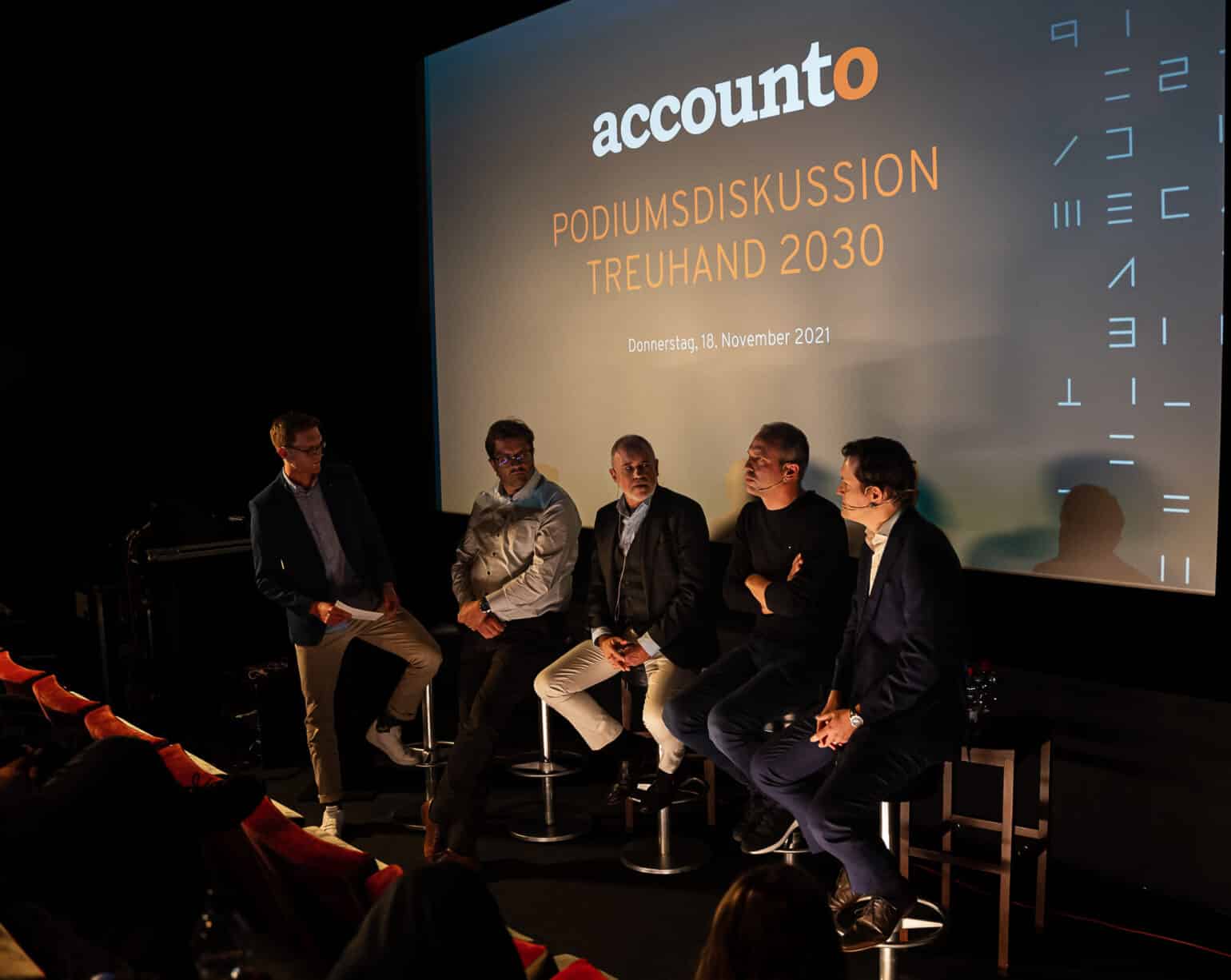
Where Daniel Craig or Scarlett Johansson usually appear across the screen, last week everything revolved around the future of the fiduciary industry. What was special about this event? For Accounto, it was the first physical event after numerous webinars – and a panel discussion no less.
About 30 fiduciaries attended the exclusive premiere at the Riff Raff cinema in Zurich. The main protagonists were four distinguished panelists who shared their thoughts on the topic of “Fiduciary 2030” and debated their views in a controversial manner:
André Renfer: Head of Services and member of the Executive Board of Hypothekarbank Lenzburg. When experts talk about the traditional bank in Aargau, the topics of digitalization, innovation and openness are always prominent. As Co-Head of the internal Innovation Lab as well as Executive Board Member of Swiss Fintech Innovations, André is well versed in current financial trends.
“Empathy as a core competence: The platform economy is changing revenue streams, breaking down traditional structures, and has an enormous customer reach. In turn, however, values such as regionality and sustainability are growing in importance. As a result, the fiduciary is becoming the customer’s preferred digital enabler.”
André Renfer, Executive Board member Hypothekarbank Lenzburg
Boris Blaser: Digital and fiduciary go together like popcorn and cinema. With B&B Concept AG, Boris has realized his dream of having his own, completely digital fiduciary office. For the founder of Fiduciary Institute 4.0, dusty files and paper documents make the hairs on the back of his neck stand up.
“In 2030, we will effectively be paperless, location-independent and working with intelligent systems. But that also means our profession will change dramatically.”
Boris Blaser, Owner and Managing Director B&B Concept AG
Sascha Trüeb: This certified fiduciary expert learned the fiduciary business from the ground up. Sascha gained his first management experience at Findea AG, where he directed the company successfully for several years. Since 2016, with two colleagues, he has been running the startup portal Fasoon, which has already assisted more than 2,000 young companies this year.
“The fiduciary of the future will serve more clients than today and will need to acquire expertise outside of accounting. But to be successful, his services must remain personal.”
Sascha Trüeb, Co-Founder Fasoon
Thomas Koller: The long-serving Chairman of the Board of Directors and partner of OBT AG knows the fiduciary industry inside out and is very well networked within it. As he wanted to get closer to the operating business again, Thomas set up his own SME consultancy last October. As a board member of EXPERTSuisse, he continues to actively shape the future of Swiss fiduciary companies.
“The fiduciary industry 2030… more digital – more attractive – more competitive”
Thomas Koller, former Chairman of the Board of OBT AG
6 key insights from the discussion
At the event, an interesting debate emerged around changing customer needs, the future role of fiduciary companies in SME ecosystems, and potential approaches to innovation. The main insights that stood out were:
Fiduciary 2030 is more than digitalization
As in every sector of the economy, fundamental changes are on the horizon in the fiduciary industry. New technologies such as blockchain are bringing a fresh dynamic to the market that goes far beyond digitalization (mapping analog processes in the digital world).
Fiduciary companies face new needs and expectations
Black or white often fails to take sufficient account of complexity. Nevertheless, it is becoming clear that young entrepreneurs tend to have different needs and expectations. For this target group, the fiduciary company 2030 should be inexpensive, digital, individual and, above all, personal.
The fiduciary as CFO is now a thing of the past
Does the future of fiduciary companies lie in CFO services? Not entirely! Rather, fiduciaries will take on a 360-degree advisory role, allowing them to increasingly attend to private matters (e.g. prenuptial agreements, divorces, etc.).
No one pays for standard services anymore
Currently, many fiduciary companies continue to earn their money by providing standard services; in the medium term, however, no one will want to pay for these services due to automation. Therefore, services such as accounting must be viewed as a classic object of utility (commodity) and need to be billed accordingly.
Stabilize revenue with more volume and innovative services
Fiduciary companies compensate for the loss of accounting revenue by managing more client accounts in the same period and creating new services. It also seems worthwhile to specialize in certain customer segments (e.g. by industry or size).
A modern IT infrastructure and human capital are the key factors for success
In the fiduciary company of the future, nothing will work without IT. The goal should be to automate as many processes as possible and build a flexible infrastructure. Despite the technological advances, fiduciary companies will continue to depend on qualified specialists in the future. In order to attract these specialists, new approaches to personnel and recruitment are required.
Last year, we prepared a number of documents to give you an idea of what “Fiduciary Industry 2030” will look like.
For example, would you like to know what the role or business model of fiduciary companies will be in 2030? Then you can’t afford to miss our white paper “Fiduciary 2030”.
Looking for ideas and approaches on how to innovate in your own fiduciary company? Our checklist “Fiduciary Company 2030” is designed to help you approach the transformation systematically.
Last but not least, once again we would like to thank everyone who made this Accounto premiere possible. The Accounto team is already looking forward to shooting the next blockbuster – with you as the leading actors!




